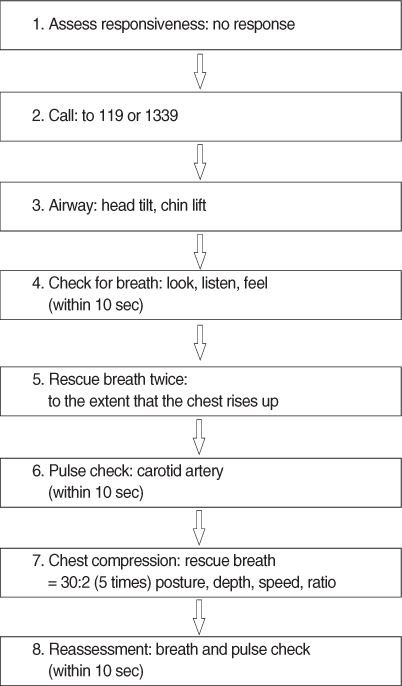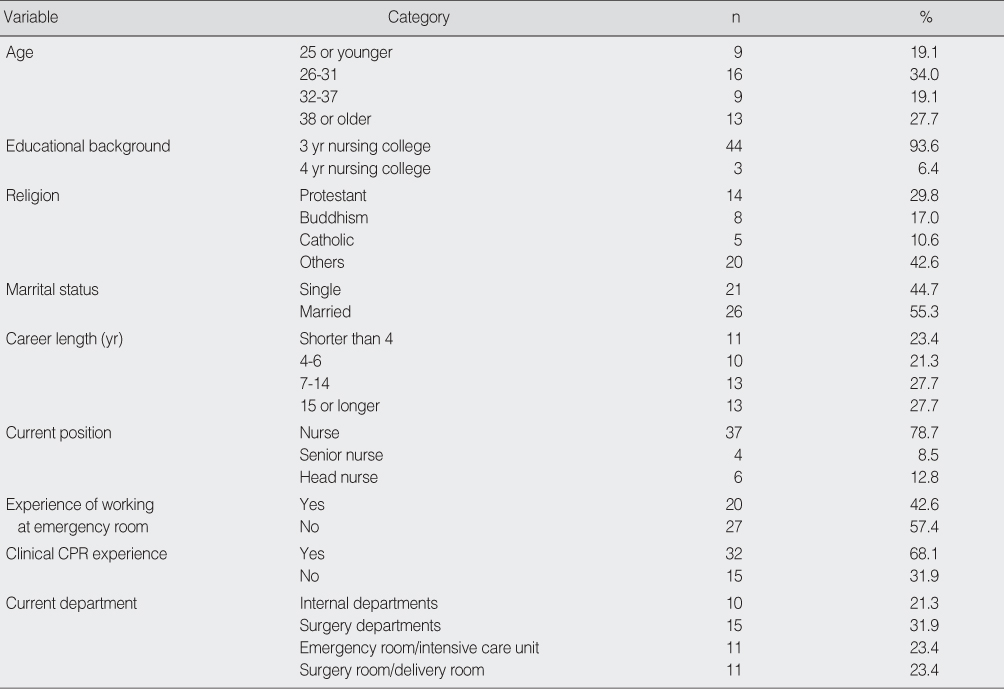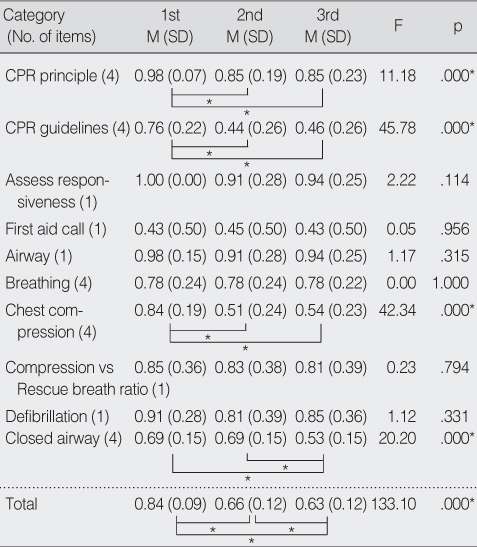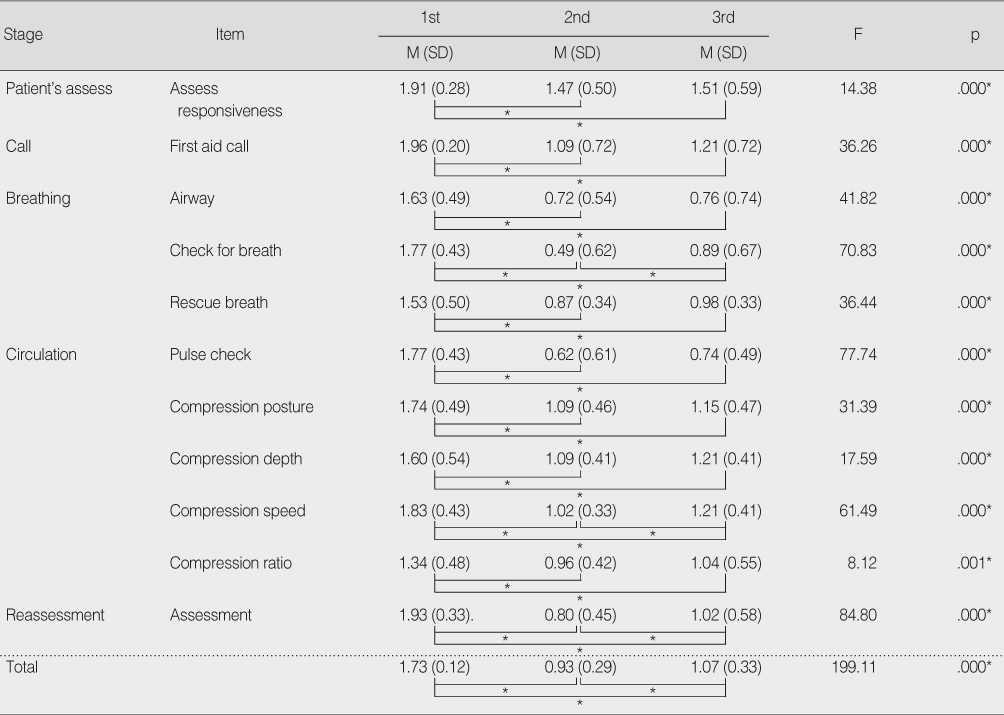Articles
- Page Path
- HOME > J Korean Acad Nurs > Volume 38(3); 2008 > Article
-
Original Article
- A Study on the Sustainable Effects of Reeducation on Cardiopulmonary Resuscitation on Nurses' Knowledge and Skills
- Soo-IL Oh, Sang-Sook Han
-
Journal of Korean Academy of Nursing 2008;38(3):383-392.
DOI: https://doi.org/10.4040/jkan.2008.38.3.383
Published online: June 30, 2008
1Nursing Director, Gyeonggi Provincial Medical Center Pocheon Hospital, Pocheon, Korea.
2Professor, College of Nursing Science/East-West Nursing Research Institute, KyungHee University, Seoul, Korea.
- Address reprint requests to: Oh, Soo-IL. Gyeonggi Provincial Medical Center Pocheon Hospital, 243-4 Shinup-dong, Pocheon 487-804, Korea. Tel: 82-31-539-9465, Fax: 82-31-539-9137, odri40@hanmail.net
• Received: November 25, 2007 • Accepted: April 12, 2008
Copyright © 2008 Korean Society of Nursing Science
Figure & Data
REFERENCES
Citations
Citations to this article as recorded by 

- CAN WE TEACH THE BASIC LIFE SUPPORT TO HEALTH SCIENCES STUDENTS?
Nursemin ÜNAL, Dercan GENÇBAŞ, Gamze ALINCAK
Karya Journal of Health Science.2023; 4(1): 65. CrossRef - Investigating Emergency Department Nurses’ Educational Needs and Exploring Strategies to Meet Challenges Against Management of These Needs: A Qualitative Study
Farnoush Azizi, Behnam Honarvar, Zahra Molazem, Azar Kazemi, Banafsheh Tehranineshat
Shiraz E-Medical Journal.2023;[Epub] CrossRef - Factors Affecting Cardiopulmonary Resuscitation Practice Among Nurses in Mizan Tepi University Teaching Hospital, Tepi General Hospital, and Gebretsadik Shawo Hospital, Southwest Ethiopia
Mirresa Guteta
Open Access Emergency Medicine.2022; Volume 14: 165. CrossRef - Comparison of Long-Term Effects between Chest Compression-Only CPR Training and Conventional CPR Training on CPR Skills among Police Officers
Byung-Jun Cho, Seon-Rye Kim
Healthcare.2021; 9(1): 34. CrossRef - Effects of a Simulation-Based CPR Training Program on Knowledge, Performance, and Stress in Clinical Nurses
Sohyune R. Sok, Jung A. Kim, Yoonshin Lee, Youngmi Cho
The Journal of Continuing Education in Nursing.2020; 51(5): 225. CrossRef - Factors Influencing for Intention to Perform Cardiopulmonary Resuscitation in Elementary and Secondary School Teachers
Kyoung Sun Song, Kyung-Yeon Park
Journal of Korean Academy of Community Health Nursing.2020; 31(3): 384. CrossRef - Current state of knowledge of basic life support in health professionals of the largest city in Pakistan: a cross-sectional study
Babar Irfan, Ibrahim Zahid, Muhammad Sharjeel Khan, Omar Abdul Aziz Khan, Shayan Zaidi, Safia Awan, Sobia Bilal, Omar Irfan
BMC Health Services Research.2019;[Epub] CrossRef - Predicting Factors on Performance Confidence of Cardiopulmonary Resuscitation in Community Members
Su-Jin Lee
Journal of Digital Contents Society.2018; 19(9): 1699. CrossRef - Retention Effect of Basic Life Support Education Program on Attitude, Knowledge, Skillfulness for Nursing Students
Myeong Sook Ahn, Hyun Sook Jo, Dong Choon Uhm, Hyun Hee Ji
Journal of Korean Academic Society of Nursing Education.2017; 23(4): 441. CrossRef - Impact of basic life-support training on the attitudes of health-care workers toward cardiopulmonary resuscitation and defibrillation
Mostafa A. Abolfotouh, Manal A. Alnasser, Alamin N. Berhanu, Deema A. Al-Turaif, Abdulrhman I. Alfayez
BMC Health Services Research.2017;[Epub] CrossRef - Knowledge and performance of cardiopulmonary resuscitation (CPR) in dental hygiene students
Seung-Hun Lee
Journal of Korean society of Dental Hygiene.2016; 16(4): 601. CrossRef - Study of military CPR quality and education by feedback device and debriefing
Soo-Jae Moon, Seon-Rye Kim, Byung-Jun Cho
Journal of the Korea Society of Computer and Information.2016; 21(9): 107. CrossRef - Structural Equation Model of Clinical Nurses' Willingness to Perform Basic Life Support (BLS) in South Korea
Dong-Choon Uhm, Ji-Young Hwang, Myung-he Jun, Dong-ok Kim
Journal of the Korea Academia-Industrial cooperation Society.2016; 17(2): 290. CrossRef - The Effects and Continuum of CPR Education Program on CPR Knowledge, Attitude and Performance in Seafarers
Jae-Ho KIM
Journal of Fisheries and Marine Sciences Education.2016; 28(5): 1301. CrossRef - The effect of teaching cardiopulmonary resuscitation using a song
Won-Joo Lee, Chang-Seop Lee
The Korean Journal of Emergency Medical Services.2016; 20(1): 31. CrossRef - A Study on Continuity of Knowledge, Attitude, and Preventive Behavior among Elementary School Students after Tuberculosis Prevention Education
Gyeong Mi Kim, Heejin Kim, Chung Mo Nam, Sun Ha Jee
Journal of the Korean Society of School Health.2016; 29(3): 209. CrossRef - Relationship between Non-technical Skills and Resuscitation Performance of Nurses' Team in in-situ Simulated Cardiac Arrest
Eun Jung Kim, Kyeong Ryong Lee
Korean Journal of Adult Nursing.2015; 27(2): 146. CrossRef - The Effects of Convergence-Based Reeducation on Core Basic Nursing Skills on Nursing Students' Competence and Confidence
Myung-Sook Jung, Young-Sook Kwon
Journal of Digital Convergence.2015; 13(4): 295. CrossRef - The Effects of Video Programs of Cardiopulmonary Cerebral Resuscitation Education
Gyu Ri Byun, Jeong Eun Park, Hae Sook Hong
Journal of Korean Biological Nursing Science.2015; 17(1): 19. CrossRef - Effects of cardiopulmonary resuscitation reeducation on persistence of knowledge, performance and self-efficacy of nursing students
Myeong-Jeong Chae, Jin-Hee Lee, In-Ja Song, Jin-Il Kim
The Korean Journal of Emergency Medical Services.2015; 19(1): 51. CrossRef - Analysis of attitude and influencing factors toward basic life support in the dental hygienists
Kyung-Yi Jeong, Min-Jung Cho
Journal of Korean society of Dental Hygiene.2015; 15(5): 873. CrossRef - Basic Life Support: A Questionnaire Survey to Assess Proficiency of Radiologists and Radiology Residents in Managing Adult Life Support in Cardiopulmonary Arrest and Acute Anaphylactic Reaction
Tariq Alam, Yasir Jamil Khattak, Muhammad Anwar, Asif Alam Khan
Emergency Medicine International.2014; 2014: 1. CrossRef - Knowledge and attitude toward cardiopulmonary resuscitation in dental hygienists
Kyung-Yi Jeong, Myung-Ok Ha
Journal of Korean society of Dental Hygiene.2014; 14(5): 703. CrossRef - The Implication and Persistence Effect of CPR Education on Female Nursing Students' Knowledge, Attitude, Confidence and Skills in Performing CPR
Geum-Sook Jung, Hyun-Mi Oh, Goya Choi
Journal of the Korea Academia-Industrial cooperation Society.2013; 14(8): 3941. CrossRef - Effects of Basic Life Support Education Program in Middle School Students' Basic Cardiac Life Support Knowledge, Attitude and Performance
Ji-Min Lee, Kyung-Shin Paek
Journal of the Korea Academia-Industrial cooperation Society.2013; 14(10): 4927. CrossRef - The effects of simulation-based resuscitation training on nurses' self-efficacy and satisfaction
Young Sook Roh, Woo Sook Lee, Hyun Soo Chung, Young Mi Park
Nurse Education Today.2013; 33(2): 123. CrossRef - Knowledge, Self-confidence, and Intention of BLS of Clinical Nurses Who Work at Small-medium Sized Hospitals
Dongchoon Uhm, Myunghee Jun, Young Im Park
The Journal of Korean Academic Society of Nursing Education.2012; 18(3): 446. CrossRef - Development and Evaluation of a Patient Safety-focused Inservice Education Program for Surgical Nurse
Young Mee Kim, Myung Sook You, Yaun Hee Cho, Seung Hae Park, Seung Nam Nam, Mi Ok Park, Se Young Kim, Min Young Kim
Journal of Korean Academy of Nursing Administration.2010; 16(2): 152. CrossRef - A Study on the Effectiveness of CPR Training for Nurses in the 6-Sigma Course
Suk-Hee Oh, Keum-Seong Jang
Journal of Korean Academy of Nursing Administration.2010; 16(1): 5. CrossRef
A Study on the Sustainable Effects of Reeducation on Cardiopulmonary Resuscitation on Nurses' Knowledge and Skills



Figure 1
Research design.
Figure 2
CPR action processes.
Figure 3
Diagram of education
and data collection.
Figure 1
Figure 2
Figure 3
A Study on the Sustainable Effects of Reeducation on Cardiopulmonary Resuscitation on Nurses' Knowledge and Skills
Demographic Variables of Subjects (N=47)
CPR=cardiopulmonary resuscitation.
CPR Knowledge Level of Subjects over time (N=47)
*p<.001. CPR=cardiopulmonary resuscitation.
CPR Skills over time (N=47)
*p<.001. CPR=cardiopulmonary resuscitation.
Table 1
Demographic Variables of Subjects (N=47)
CPR=cardiopulmonary resuscitation.
Table 2
CPR Knowledge Level of Subjects over time (N=47)
*p<.001. CPR=cardiopulmonary resuscitation.
Table 3
CPR Skills over time (N=47)
*p<.001. CPR=cardiopulmonary resuscitation.
 KSNS
KSNS
 E-SUBMISSION
E-SUBMISSION






 Cite
Cite

